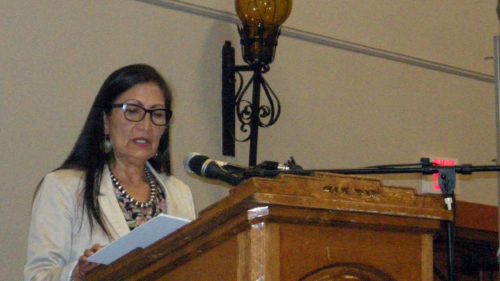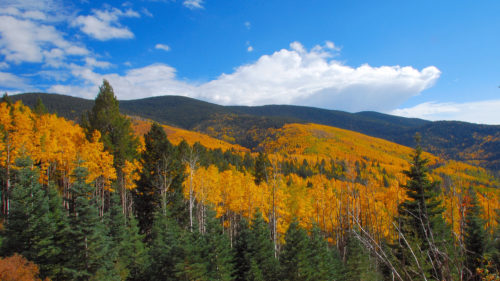Later this year, hunters and anglers nationwide could finally see Congress approve long-awaited legislation that would be a huge step forward for access to national public land, crucial conservation funding and a wide range of other important measures.
In April, the U.S. Senate approved the Bipartisan Sportsmen’s Act of 2016 as part of the broader Energy Policy Modernization Act. The Sportsmen’s Act, co-sponsored by Sen. Martin Heinrich and his Republican colleague from Alaska, Sen. Lisa Murkowski, marks a milestone achievement that Heinrich has been advocating for years.
“After previous attempts stalled on sportsmen’s bills in recent years, the Energy and Natural Resources Committee worked hard to find areas of agreement, and we didn’t allow controversial amendments from either side of the aisle to derail our effort,” he said.
The House passed its own version of a sportsmen’s bill earlier in 2016, but it does not include many of the best elements in the Senate version. The next step, according to Heinrich’s office, is for Senate and House negotiators to meet and hammer out a compromise. That should occur in the next few months.
The Sportsmen’s Act of 2016 actually contains several separate bills, which were combined into a single act. One of the most important is the HUNT Act, which Heinrich – an avid public lands hunter – drew up while he was in the U.S. House.
The bill aims to improve access to millions of acres of national public lands – primarily national forest and BLM – that currently do not have public access. It directs public land management agencies like the U.S. Forest Service and the BLM to identify high priority national lands that have hunting, fishing and outdoor recreation potential but where there is restricted or no access. The bill further directs the agencies to develop plans to provide access to landlocked areas, and to work with states, tribes and willing private landowners to achieve that goal.
A recent study by the Center for Western Priorities estimated that more than 4 million acres of national public lands in the Rocky Mountain region – including more than 500,000 acres in New Mexico – are currently “landlocked” with no legal public access. The HUNT Act is the first dedicated effort to re-open these lands to the public.
“I myself have experienced the frustration of running into a locked gate on roads that used to be open to public access,” Heinrich said in a statement. “As opportunities for hunting and fishing shrink, we’re losing the next generation of hunters and anglers who will fund tens of billions of dollars in conservation and restoration through the purchase of Duck Stamps and by paying taxes on ammunition, tackle, and motorboat fuel, all of which are dedicated directly to the conservation of fish and wildlife. This bipartisan sportsmen’s package will go a long way toward solving many of the problems hunters and anglers face in accessing and using our nation’s incredible public lands.”
To pay for the HUNT Act access improvements, the Sportsmen’s Act sets aside 1.5 percent of the Land and Water Conservation Fund or $10 million, whichever is greater. That fund, which comes from federal offshore oil and gas revenues, could provide millions of dollars to purchase easements from willing landowners or to create access routes through public land.
Another key piece of the Sportsmen’s Act and a longtime goal of New Mexico Wildlife Federation and other sportsmen’s groups is permanent reauthorization of the Land and Water Conservation Fund. The fund, which was created with strong bipartisan support in Congress in 1965, is one of the country’s most successful conservation programs.
It was established to enhance Americans’ outdoor recreation opportunities. In New Mexico the fund has been used to purchase high-quality lands such as Valles Caldera, make improvements in national forests, build boat ramps and shooting ranges, and even construct ball fields and municipal parks.
The fund also has been used to protect watersheds and municipal drinking water supplies, while at the same time protecting quality wildlife habitat for a wide range of fish and game.
- Other elements of the Sportsmen’s Act:
Reauthorize the North American Wetlands Conservation Act (NAWCA) through 2019, providing matching grants to organizations, state and local governments and private landowners to acquire, restore and enhance wetlands critical to migratory birds. This program generates three additional dollars for every federal dollar. In New Mexico, NAWCA funds have been used to protect key habitat in the middle Rio Grande valley; - Designate of two wilderness areas within the Rio Grande del Norte National Monument – the Rio San Antonio and Cerro del Yuta (Ute Mountain) areas. Both areas have been managed as wilderness for many years, and both are currently roadless;
- Require BLM and Forest Service lands to be open for hunting, fishing and recreational shooting unless specifically closed through an open and public process;
- Extend and increase states’ authority to allocate Pittman-Robertson funding for shooting ranges on public lands, and encourages federal land agencies to cooperate with state and local governments to maintain shooting ranges;
- Authorize the transportation of bows and crossbows on National Park Service lands, provided the bows or crossbows remain in a vehicle as it crosses the NPS unit;
- Establish a Critical Maintenance and Revitalization Conservation Fund for the National Park Service to address high-priority deferred maintenance needs. The fund cannot be used for land acquisition;
- Authorize the National Fish Habitat Conservation Program to encourage partnerships among public agencies, tribes, sportsmen, private landowners, and other stakeholders to promote fish conservation;
- Reauthorize the Federal Land Transaction Facilitation Act, which directs revenue from the sale of public land to the acquisition of high priority conservation lands from willing sellers. The goal of the program is to expand fish and wildlife habitat and public recreational opportunities at no additional cost to U.S. taxpayers.
All these programs benefit hunters, anglers and other public lands users, but also strengthen local, state and regional economies. Nationwide, outdoor recreation spending is nearly $650 billion a year and supports hundreds of thousands of jobs. In New Mexico, outdoor recreation is one of the pillars of the economy – hunters and anglers alone spend some $600 million a year.
“Sportsmen and women nationwide appreciate the efforts of Sen. Heinrich and his colleagues in the Senate for passing this crucial legislation,” said Garrett Vene Klasen, executive director of the New Mexico Wildlife Federation. “We hope that the U.S. House will act quickly to adopt these same sensible measures protecting our outdoor traditions, our wildlife habitat and watersheds, and the outdoor recreation economy.”



